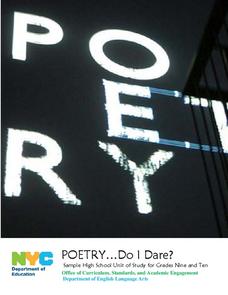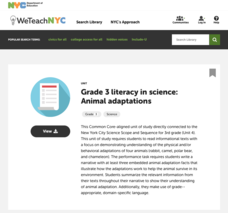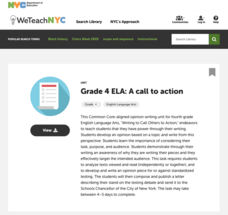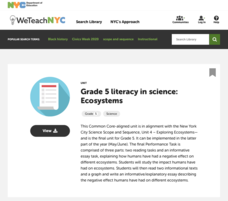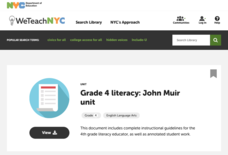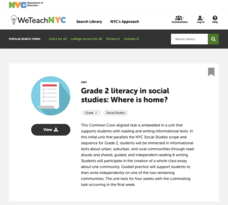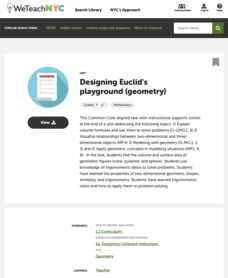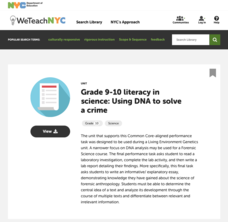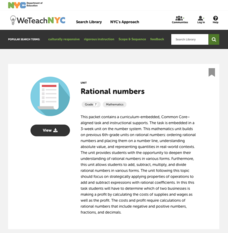New York City Department of Education
Peter’s Garden
Watch scholars' understanding of fractions bloom. The resource presents a performance task where the fractions are equal parts from the same whole, and mathematicians must use them to solve problems about a grade level garden. Teachers...
New York City Department of Education
Grade 8 Science: Genetic Modification of Organisms
Genetic modification is a hot topic in the science and political world. A complete unit gives learners an opportunity to research genetic modification, play an interactive genetic engineering simulation, and interact with the information...
New York City Department of Education
What Did I Do to Be so Black and Blue: How Did Jazz Influence Ralph Ellison's Invisible Man
How did jazz influence Ralph Ellison's Invisible Man? Class members read some of Ellison's non-fiction writings about blues and jazz, listen to records, watch videos, and engage in student-centered discussions. They then produce podcasts...
New York City Department of Education
Egypt
This six-week unit encompasses all subjects with a focus study on world history and the development of ancient civilizations. As gifted and talented students dive into the interesting yet challenging topic of Egypt, they...
New York City Department of Education
Learning about Lunar New Year
Rich in images and information, a teacher's guide to the traditions of Lunar New Year's celebrations in various cultures addresses celebrations of Buddhism and Daoism. It includes background information about the origins of the...
New York City Department of Education
Poetry…Do I Dare?
Whether you're considering a poetry unit or just want to incorporate more poetry in your curriculum, this unit plan is a must-have. Packed with poems, teaching points, powerful prompts, and poetry performance suggestions, the resource is...
New York City Department of Education
Project Based Learning
After reviewing the information included in this resource, you will be an expert in both the definition of project-based learning and how to implement it with your class. Discover and explore thorough explanations, detailed...
New York City Department of Education
Grade K Literacy in Social Studies: Thinking About Families
Family is a wonderful subject for little learners to get excited about. Family is also the theme for a social studies unit that uses literacy standards throughout. The guide outlines approximately three weeks of instruction and breaks...
New York City Department of Education
Grade 3 Literacy in Science: Animal Adaptations
Third graders research and study animal adaptations and then use their findings to write narratives that include scientific criterion. This lesson is all about literacy and science! The lesson is completely designed for addressing Common...
New York City Department of Education
Grade 3 Literacy: Investigating Sharks
Shark! Scholars read about sharks in Facts about Sharks by Susanna Batchelor. They then pretend they are shark scientists and choose a shark they want to study. Learners research their sharks and record information in graphic organizers...
New York City Department of Education
Grade 5 Literacy: TCRWP Nonfiction Reading and Opinion/Argument Writing
Choose a side! Pupils watch and read several nonfiction resources about zoos. After gathering their research, they choose a side either for or against closing zoos. Scholars complete KWL charts, anticipation guides, flow charts, and...
New York City Department of Education
Grade 5 Literacy in English Language Arts: Should the School Day Be Longer?
Scholars read newspaper articles relating to a longer school day and complete note-taking organizers as they read. They then form opinions and complete outlines before writing essays supporting their point of view.
New York City Department of Education
Grade 4 Literacy in English Language Arts: A Call to Action
You have the power! Scholars learn that they have power of the pen in their writing. After reading and viewing various sources about standardized testing, they express their own opinions about the testing by writing letters to the...
New York City Department of Education
Grade 5 Literacy in Science: Ecosytems
How do humans affect ecosystems? Learners read two articles and interpret a graph to develop essays on the human impact on ecosystems. They read about human impact on tigers and manatees as a basis for their overarching papers.
New York City Department of Education
Grade 4 Literacy: John Muir Unit
Learn how to correctly analyze and score a written performance task. Example work shows annotated think alouds for grading. Teachers also have access to graphic organizers for helping writers succeed,
New York City Department of Education
The Game of Life
Academics use their research skills to create a financial guidebook for young adults. They also learn about the skills needed to be successful as an adult, including how to use credit cards and how to buy a car. Hands-on activities and...
New York City Department of Education
Grade 2 Literacy in Social Studies: Where Is Home?
What makes a community? How communities differ? Young scholars research different types of communities, small rural towns, and large crowded cities. They respond to writing prompts, and write essays in groups to understand the wide...
New York City Department of Education
Grade 11 Literacy in Social Studies: Research Paper
The lesson guides young academics through the steps in producing a 10-page research paper on any topic in American history. Historians begin by formulating a thesis and gathering resources, then move on to creating an outline, and end...
New York City Department of Education
Designing Euclid’s Playground
Create a geometric playground. Pupils work through a performance task to demonstrate their ability to use geometric concepts to solve everyday problems. The accompanying engineering design lessons show teachers how the assessment works...
New York City Department of Education
Chris’ Garden Dilemma
Make the connections between area, tiling, and multiplication. A performance task and associated unit presents the concept of area and makes the connection to multiplication. Pupils work through three major sections of instruction that...
New York City Department of Education
Isabella’s Garden
Create rows and rows of vegetables. Pupils use their knowledge of multiplication to find the number of vegetable shoots planted in a garden and ways to arrange the vegetables in the performance task. Teachers use the suggested unit...
New York City Department of Education
Dance and Text
Use texts and dances to teach inequalities and equations. A sixth-grade unit covers using variables in equations and inequalities to solve problems. Learners show what they know at the end of the unit using two performance tasks, one...
New York City Department of Education
Grade 9-10 Literacy in Science: Using DNA to Solve a Crime
Scholars become detectives and use science to solve a crime! A complete unit introduces DNA and includes hands-on activities that have learners model DNA and extract it from different food types. A culminating activity challenges...
New York City Department of Education
Rational Numbers
Order up a unit on rational numbers. A unit overview gives a basic outline of instruction and activities on rational numbers for the 7.NS domain. A performance task on profits at pizzerias assesses understanding of the concepts in the...







